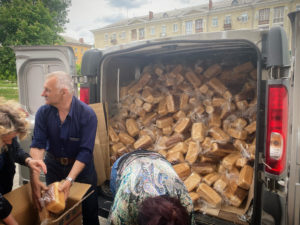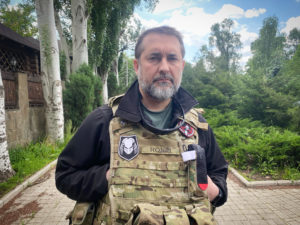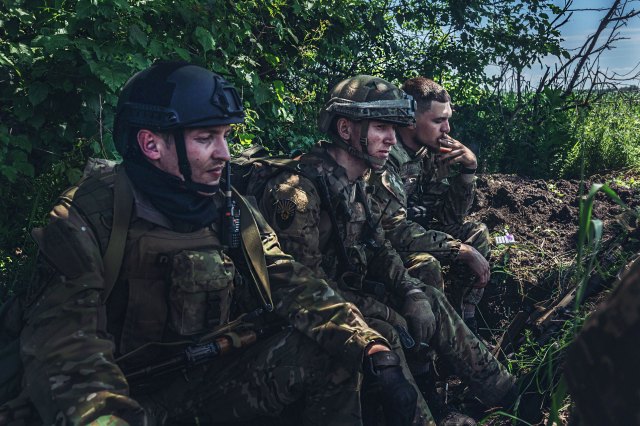‘To put it mildly, we’re barely afloat’ (Diego Herrera Carcedo/Anadolu Agency via Getty Images)

Bakhmut, Donetsk Oblast
“I guess the Russians will be here in a week,” 65-year-old Viktor tells me as he sits on a bench chewing sunflower seeds in the empty streets of Bakhmut, eastern Ukraine. “I’ll stay of course — I have nowhere else to go. It’s fucking horrible. There’s no gas, and already my wife and I are preparing paraffin lamps for when the electricity goes. What else can we do?” Once a thriving industrial town centered on its vast salt mine, Bakhmut is now almost deserted as the bloody war in Ukraine’s Donbas region reaches deeper into Ukrainian government-held territory.
Entering Bakhmut, at the end of a long drive passed by military vehicles going towards the front, and ambulances and fuel trucks coming back, a line of black smoke clouds stands out against the blue sky as Ukrainian artillery pounded the Russian tanks approaching the city limits. Elite Russian forces, believed to include the 90th Guards Tank Division and the VDV paratroops who were so badly mauled in the failed encirclement of Kyiv at the beginning of the war, are now only around 5km to the east of Bakhmut, and 9km to the north. Images from social media indicate the Russian army has deployed its new, and rare BMPT “Terminator” vehicles, specifically designed for gruelling urban combat, on the approaches to the city, perhaps indicating preparation for an assault sooner than many observers expect.
Ukraine’s stunning and unexpected string of victories over the Russian invaders in the first phase of the war may have bred a sense of complacency in well-meaning outside observers. A narrative has evolved, particularly among Ukraine’s Western supporters, that the Russian army is a paper tiger, that its soldiers are a rabble of undermotivated conscripts and that its generals are inept. But here in the Donbas region, where the Russians have concentrated their forces behind a creeping, devastating wall of artillery firepower, Russia holds a clear advantage.
Lightly-equipped and poorly-trained Territorial Defence volunteers have been sent from Ukraine’s western regions to plug the gaps, as the grinding war of attrition by artillery takes its toll on the regular army. Outnumbered by seven to one in some areas, according to Ukraine’s President Zelenskyy, Ukrainian forces are outranged by Russian artillery and outmatched by newly-concentrated Russian armour. Russian language propaganda, rarely transcribed in Western narratives, is exultant: Ukrainians are bracing for the worst.

The Ukrainian government’s official messaging seems to be preparing the country for hard news, with Zelenskyy warning the nation that “the situation in Donbas is extremely difficult” as the Russians push towards Sloviansk and Severodonetsk. Last Thursday, Zelenskyy’s presidential advisor Oleksiy Arestovych warned that Russia is trying to create “a new Mariupol” in the Donbas, adding that “we are in a difficult situation, and it will get worse”, as “there may be encirclements, abandonment of positions, and heavy casualties” because “they have superiority in artillery and aviation… To put it mildly, we’re barely afloat.”
The day before I arrived in the Donbas, Russian troops captured the town of Lyman 20km northeast of Sloviansk, well within artillery range, and are now focusing their fire on the small town of Rayhorodok, the last settlement between Sloviansk and the Russian army. From the north and from the southeast, outside Bakhmut — the Russian pincer already threatening to encircle thousands of the Ukrainian army’s most experienced and best equipped forces is now arching wider to slowly squeeze Sloviansk itself.
Even as Ukrainian forces fortify the Donets river that is now their most valuable asset, a Russian breakthrough from the town of Popasna to the east, for years one of Ukraine’s best-defended positions, is endangering what remains of Ukraine’s narrow toehold in the Donbas. The open steppe landscape of the Donbas is harder terrain for Ukrainian troops to defend than the the thick forests of the country’s north, and it is now the Ukrainians who face the challenge of moving men and materiel across overextended supply lines, nearly 1,000 miles from the western cities where NATO military aid is arriving in heavily-publicised but sporadic deliveries
Ukraine’s industrial heartland, the Donbas region is divided between two provinces, Luhansk and Donetsk, both ravaged by eight years of conflict with Russian-backed separatist fighters. Today the Russians control more than half of Donetsk region, and 95% of Luhansk. The government in Kyiv now faces the difficult choice of either abandoning Severodonetsk to preserve its forces intact, handing Russia another sizeable victory after Mariupol and Lyman, or defending the city in what will likely be bloody and destructive urban fighting, risking the annihilation of its garrison if they are cut off from resupply.
At an impromptu press conference in Bakhmut, Luhansk’s regional governor Serhei Hayday, now effectively in exile from his own province, stepped out of an armoured van in full tactical gear, emblazoned with his nom de guerre “Ronin”, to summarise the situation. Forced out of his own regional base, Severodonetsk, by Russia’s grinding advance, Hayday insisted that Ukraine would one day recapture its lost territories in Luhansk, while hinting that a tactical withdrawal might soon be necessary.

“Our main goal is to win the war, not to win a battle for one city, Severodonetsk,” he told me, ”It’s a great pain for me, because it’s the administrative centre of Luhansk oblast and this is my native city. I was born there, I have a lot of connections with it. But I understand we need to preserve our soldiers, to regroup… If the retreat is necessary, well, such is the fate of the city. But we will win in the end.” As he spoke, a Russian shell crashed somewhere into the city behind him, setting off the car alarms around us. As for Bakhmut and Sloviansk in Donetsk, the Russians have not crossed the Donets river, Hayday told me, “but during the next two months they might advance. But we will stop them. The main thing is to receive Western help as soon as possible.”
For the Ukrainian army, long-range artillery that can match Russia’s concentrated and overwhelming resources is the only thing that can turn the tide. Earlier in Bakhmut, a soldier shopping for supplies at one of the last open mini-markets complained about the shelling he had undergone. “I’m just so tired, I need to sleep,” he sighed. At a medical facility in Bakhmut, before we were ordered away by a furious Ukrainian officer, army medics sat around smoking while lightly wounded soldiers limped away from treatment, and a soldier scrubbed a blood-soaked stretcher clean with a broom. While a great deal of effort has been expended by OSINT analysts on totting up Russian casualties, there has been far less interest in recording Ukrainian casualty figures, about which the Ukrainian government is guarded. Zelenskyy has recently announced that between 50 and 100 Ukrainian soldiers are killed every day in Donbas.
So far, Bakhmut itself has only been lightly shelled compared to the defensive lines being pummelled outside the city, but civilians have been killed, and nerves are fraught. “There are bombs, shells, shooting but here we still are,” 75-year-old Vladimir shrugged as he waited for a trolley bus, “My house is on the outskirts of the city and my windows are all shattered. But I’ll stay, it’s fine, what else can I do?”
Outside the mini-market, as Ukrainian troop convoys and volunteer ambulances rumbled through its handsome neoclassical boulevards, a 36-year-old woman who preferred not to be named complained about the situation for the last civilians left living in Bakhmut. “The Russians are bombing civilian houses, and my house was shaking from the impacts,” she told me, “People nearby were killed in their beds. Humanitarian aid is distributed chaotically, some people take all the food and some are left with nothing. There’s no order here, no cash left in the ATMs, and we have no bread. I can’t leave, I have a beautiful house here, I had a wonderful life in this city, we just want them all to go away and leave us to live like we did before.”
Bakhmut’s civilian police have reportedly already withdrawn from the city, apart from the detachments manning checkpoints on the outskirts, and the distribution of aid is difficult as government infrastructure crumbles under the pressure. Outside a local government building, civilian volunteers unloaded a white van piled high with loaves of bread sent from a bakery in Dnipro, four and a half hours’ drive away, to be delivered in the city and in nearby villages wracked by fighting. At a playground nearby, a pair of middle-aged women sat on a bench watching their young children scramble over the slides, whooping with joy in the early summer sun. “We are from Soledar,” a frontline town 15 km north on the road to Severodonetsk, Olena, a pharmacy worker, told me. “Everything is destroyed there, by tanks, by Grad rockets, everything.”
“We don’t want the Russians to come here,” her friend Svetlana added, shaking her head, “We don’t know where to go, we have small kids, all the factories are closed and we have no money to live anywhere else.”
In the nearby city of Sloviansk, talked up by Ukraine’s well-wishers as an impregnable fortress, the head of the Civil Military Administration, Vadim Lyakh is urging civilians to leave as soon as they can, before it’s too late. His posts on Facebook advertise the times of the buses out of the city he has organised, and alert the remaining civilians to the few ATMs and bakeries working on any particular day. Talking to the civilians under his care, he urges them to leave before Sloviansk suffers the same fate as the other cities in the path of Russia’s assault. But speaking to me in his office, as an air raid siren wailed outside the window, he sounded considerably more upbeat.
“The situation has been complicated here for a long period of time,” he told me. ”We were nearly encircled but our army helped to prevent it. They attacked from the direction of Izyum but our army stopped them. Now they try to advance through Lyman, but they are still fighting in Lyman and there is a river. So, now the situation is complicated but under control. Our troops are there, and there is a water barrier. I don’t think they`ll succeed. It is very hard.”
When I asked him how long he expected it to take until Sloviansk was itself the frontline, he shrugged, saying “I’m not a military expert. Everything depends on the Lend-Lease, and how fast the [American] weapons will get here. That’s what the experts say. The artillery will help us to defend and to counterattack.” But Britain’s Ministry of Defence has warned that “in the coming days, Russian units in the area are likely to prioritise forcing a crossing of the river”, and the longed-for long-range artillery from the West is yet to be signed off, let alone arrive. Meanwhile, the Russian armour massing outside Bakhmut, south of the Donets river, suggests time is running worryingly short.
With no cooking gas, its cafes and restaurants all shut, and few shops open, life in Sloviansk is increasingly uncomfortable for the remaining civilian population, running out of money as work evaporates. The air raid sirens wail all night, and the sound of outgoing artillery rumbles like thunder throughout the day. In the morning, civilians queue for cash at the few functioning ATMs, and by late afternoon the city’s streets are deserted. Outside his pet shop in Sloviansk’s city centre, I asked Ihor, 33, if he expected the Russians to come. “I guess it’s 50/50 now,” he shrugged, “they’re only a few kilometers away, you see the situation,” he said, gesturing at the loud crump of Ukrainian artillery firing another barrage at the Russians advancing from the north, “but I’m stockpiling food and water, and I’ll stay whatever happens.”
In the opening phase of the war, Ukraine’s regular and volunteer forces put up a valiant and stunningly effective defence against thinly-stretched Russian troops, who were seemingly unprepared for the level of resistance they would face. But if outside observers initially underestimated Ukraine’s willingness and capacity to fight back, now the danger is that they have underestimated Russia’s potential to inflict serious damage on Ukrainian forces and seize important territory. Massing their troops and artillery for slow, limited offensives, creeping behind a punishing wall of shellfire, the Russians are incrementally gaining ground while limiting their own casualties, and inflicting heavy damage to which Ukrainian forces are finding it difficult to respond.
Three months into a war that has so far seen a litany of stunning and unexpected Ukrainian victories, the momentum is now shifting towards Russian success in the Donbas. Over the medium and long-term, as Ukraine trains and equips new units with the heavy weapons arriving from the West, the pendulum may well swing back in the country’s favour. While many Ukrainians are certain of victory in the end, the sense of relief and optimism that marked the war’s springtime of victories is beginning to fade as Ukraine enters what will be a hard and bloody summer on the eastern front.










Join the discussion
Join like minded readers that support our journalism by becoming a paid subscriber
To join the discussion in the comments, become a paid subscriber.
Join like minded readers that support our journalism, read unlimited articles and enjoy other subscriber-only benefits.
Subscribe